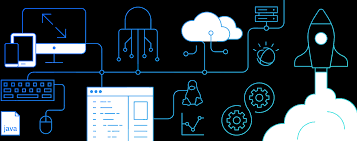Exploring the Dynamic World of Software and Web Development
The World of Software and Web Development
In today’s digital age, software and web development play a crucial role in shaping our online experiences. From the applications on our smartphones to the websites we visit daily, developers are the architects behind the scenes, creating functional and engaging platforms for users worldwide.
Software Development
Software development involves designing, coding, testing, and maintaining software applications. Developers use programming languages like Java, C++, Python, and more to build desktop applications, mobile apps, and enterprise software solutions. The process typically follows a structured approach known as the software development life cycle (SDLC), which includes phases such as planning, design, implementation, testing, deployment, and maintenance.
Web Development
Web development focuses on creating websites and web applications that are accessible via the internet. Front-end developers work on the user interface and user experience aspects of a website using technologies like HTML, CSS, and JavaScript. Back-end developers handle server-side logic and database interactions using languages such as PHP, Ruby on Rails, or Node.js. Full-stack developers are proficient in both front-end and back-end technologies.
The Intersection of Software and Web Development
As technology continues to evolve rapidly, the lines between software development and web development are becoming increasingly blurred. Many modern applications combine elements of both disciplines to deliver seamless user experiences across multiple platforms. This convergence has led to the rise of frameworks like React Native and Electron that allow developers to create cross-platform applications efficiently.
The Future of Development
With emerging technologies such as artificial intelligence (AI), blockchain, augmented reality (AR), and Internet of Things (IoT) gaining traction, the future of software and web development looks promising. Developers who stay abreast of industry trends and continuously upskill themselves will be well-positioned to meet the demands of tomorrow’s tech landscape.
8 Essential Tips for Effective Software and Web Development
- Write clean and well-structured code for easier maintenance.
- Use version control systems like Git to track changes and collaborate with others.
- Test your code thoroughly to catch bugs early on.
- Follow best practices for security to protect user data.
- Optimize website performance by reducing load times and improving responsiveness.
- Stay updated with the latest trends and technologies in the industry.
- Document your code to make it easier for others to understand and work with.
- Seek feedback from peers or mentors to improve your coding skills.
Write clean and well-structured code for easier maintenance.
Writing clean and well-structured code is a fundamental tip in software and web development that greatly contributes to easier maintenance of projects. By adhering to coding best practices, such as proper indentation, meaningful variable names, and consistent formatting, developers can enhance the readability and maintainability of their codebase. Well-structured code not only makes it easier for developers to debug and troubleshoot issues but also facilitates collaboration among team members working on the same project. Ultimately, investing time in writing clean code upfront can save significant effort in the long run and ensure the scalability and sustainability of software applications.
Use version control systems like Git to track changes and collaborate with others.
Utilizing version control systems like Git is essential in software and web development for effectively tracking changes and facilitating collaboration among team members. By using Git, developers can maintain a history of modifications made to the codebase, allowing for easy identification of errors, reverting to previous versions if needed, and ensuring seamless integration of new features. Moreover, Git enables multiple developers to work on the same project simultaneously without conflicts, as changes can be merged and managed efficiently. Embracing version control systems like Git enhances productivity, promotes better teamwork, and ensures the integrity of the development process.
Test your code thoroughly to catch bugs early on.
Testing your code thoroughly is a critical step in software and web development to catch bugs early on. By conducting comprehensive testing, developers can identify and rectify issues before they escalate, ensuring the reliability and functionality of their applications. Through various testing methods such as unit testing, integration testing, and user acceptance testing, developers can enhance the quality of their code and deliver a seamless user experience. Prioritizing thorough testing not only saves time and resources in the long run but also fosters a culture of quality assurance within the development process.
Follow best practices for security to protect user data.
It is essential for software and web developers to follow best practices for security to safeguard user data effectively. By implementing robust security measures, such as encryption, authentication protocols, and regular security audits, developers can mitigate the risk of data breaches and unauthorized access. Prioritizing the protection of user data not only enhances trust and credibility but also ensures compliance with data protection regulations. By staying vigilant and proactive in addressing security concerns, developers can create a safer online environment for users and uphold the integrity of their applications and websites.
Optimize website performance by reducing load times and improving responsiveness.
To enhance website performance, it is crucial to focus on optimizing load times and responsiveness. By reducing the time it takes for a website to load and ensuring that it responds swiftly to user interactions, developers can significantly improve the overall user experience. Implementing strategies such as minimizing file sizes, leveraging browser caching, and optimizing code can help streamline the loading process and make the website more responsive, ultimately leading to higher user satisfaction and engagement.
Stay updated with the latest trends and technologies in the industry.
Staying updated with the latest trends and technologies in the software and web development industry is crucial for professionals looking to remain competitive and relevant. By keeping abreast of emerging tools, frameworks, and best practices, developers can enhance their skill set, deliver cutting-edge solutions, and adapt to the evolving needs of clients and users. Continuous learning and exploration of new technologies not only expand one’s knowledge base but also open up opportunities for innovation and growth in this dynamic field.
Document your code to make it easier for others to understand and work with.
Documenting your code is a crucial practice in software and web development that can significantly enhance collaboration and maintainability. By providing clear and concise explanations within your codebase, you not only make it easier for others to understand the logic and functionality of your code but also facilitate smoother transitions for team members who may need to work on the project in the future. Well-documented code serves as a valuable resource that promotes efficiency, reduces errors, and fosters a more cohesive development process overall.
Seek feedback from peers or mentors to improve your coding skills.
Seeking feedback from peers or mentors is a valuable practice for enhancing your coding skills in software and web development. Constructive criticism and insights from others can offer fresh perspectives, identify areas for improvement, and introduce new techniques or best practices that you may not have considered on your own. By actively soliciting feedback and being open to suggestions, you can refine your coding abilities, expand your knowledge base, and ultimately grow as a proficient developer in the dynamic world of technology.




